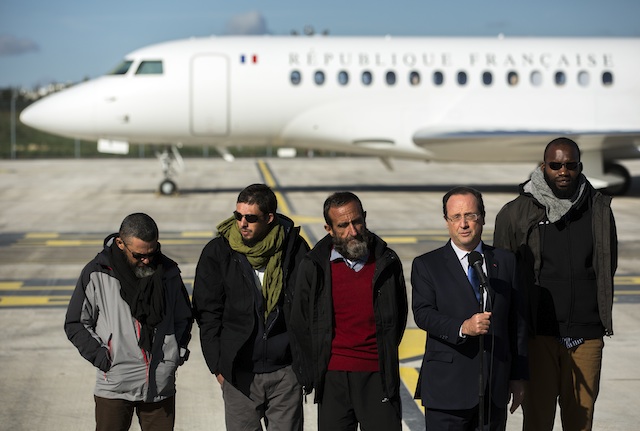SUMMARY
This is AI generated summarization, which may have errors. For context, always refer to the full article.

PARIS, France – Four Frenchmen held captive for three years by an Al-Qaeda offshoot in north Africa were reunited with their families on Wednesday, October 30, as sources said at least 20 million euros ($28 million) had been paid in ransom.
The four men, who were kidnapped by Al-Qaeda in the Islamic Maghreb (AQIM) in northern Niger in 2010, flew into the Villacoublay military airport near Paris, where they were met by their families and President Francois Hollande.
Standing alongside the four on the tarmac, Hollande expressed his “immense joy” at their return, calling them “great French citizens who brought honor to France in their captivity.”
Thierry Dol, 32, Daniel Larribe, 62, Pierre Legrand, 28, and Marc Feret, 46, were kidnapped on September 16, 2010, from a uranium compound in Arlit, north-central Niger, where they were working for French nuclear giant Areva and construction group Vinci.
French authorities announced on Tuesday, October 29, they had been released, and the four flew back to Paris from Niger’s capital Niamey a day later.
Greeted by tearful family members on arrival, the men appeared thin but otherwise in good health. They were taken for medical checks shortly after returning to France.
Offered the microphone by Hollande after he spoke at the airport, none of the ex-hostages chose to make a public statement.
In a brief remark at the airport in Niger, Dol had told Agence France-Presse: “It was very difficult but it was the test of a lifetime.”
Defence Minister Jean-Yves Le Drian, who flew back to France with the four, said that the men spoke about their ordeal on the flight.
“In the plane, they began to speak one after another… about all that they had been through, the way they had tried to find out where they were, the conditions of their lodgings and food, their attempts to escape,” the minister said.
A source close to the Nigerien negotiating team that secured the hostages’ release told Agence France-Presse that, despite French assurances to the contrary, a ransom had been paid.
“Between 20 and 25 million euros was paid to obtain the release of the French hostages,” the source said, adding that the money included payments to the hostage-takers and intermediaries.
The daily Le Monde also quoted a French source close to the negotiations as saying that more than 20 million euros had been paid for their release.
A number of top French officials denied any money was handed over, with a source in the presidency telling Agence France-Presse: “France does not pay ransoms. This is repeated every time… There is no need to return to the subject.”
French Foreign Minister Laurent Fabius insisted on television channel TF1 that “no public money was paid”, sidestepping a question on whether private funds changed hands.
French officials including Hollande have repeatedly thanked Niger’s President Mahamadou Issoufou for helping to secure the release of the four.
The news of their release came days after regional security sources in the northern Mali town of Gao reported the presence of envoys in the Sahel region “to speed up negotiations towards freeing the French hostages”.
France officially denied sending envoys.
‘Everyone pays’
According to a high-ranking Nigerien source, the four were taken to Niamey by helicopter from Anefis in northeastern Mali near the Algerian border.
That was the site of final negotiations which included Mohamed Akotey, a former Tuareg rebel who is a senior executive with an Areva subsidiary in Niger.
The hostages were apparently held in different locations to prevent them being freed in any French assault, and were brought together just days before the release.
Three other people who were kidnapped with them – Daniel Larribe’s wife Francoise, a Togolese and a Madagascan – were freed in February 2011.
After embracing her husband on the tarmac, Francoise Larribe said the family had maintained hope despite “some very difficult moments”.
“Daniel had hope that he would return, my daughters and I also had hope,” she told reporters. “It’s been a wave of emotion. It’s incredible. We’ve been waiting for this for 37 months.”
AQIM had reportedly demanded at least 90 million euros for the release of the four hostages.
The group grew out of a movement launched in the late 1990s by radical Algerian Islamists who sought the overthrow of the Algiers government. It allied with Al-Qaeda in 2006 and operates across the Sahel region south of the Sahara.
Experts said there was little doubt that a ransom had been paid.
“Everyone pays, even the British,” said Eric Denece, the head of France’s CF2R intelligence think tank.
Britain led efforts at the G8 this year to impose a ban on such ransom payments, saying they only strengthened militant groups and encouraged kidnappings.
“Ransoms, exchanges, or by force: There is no other way to free hostages,” Denece – Rappler.com
Add a comment
How does this make you feel?
There are no comments yet. Add your comment to start the conversation.